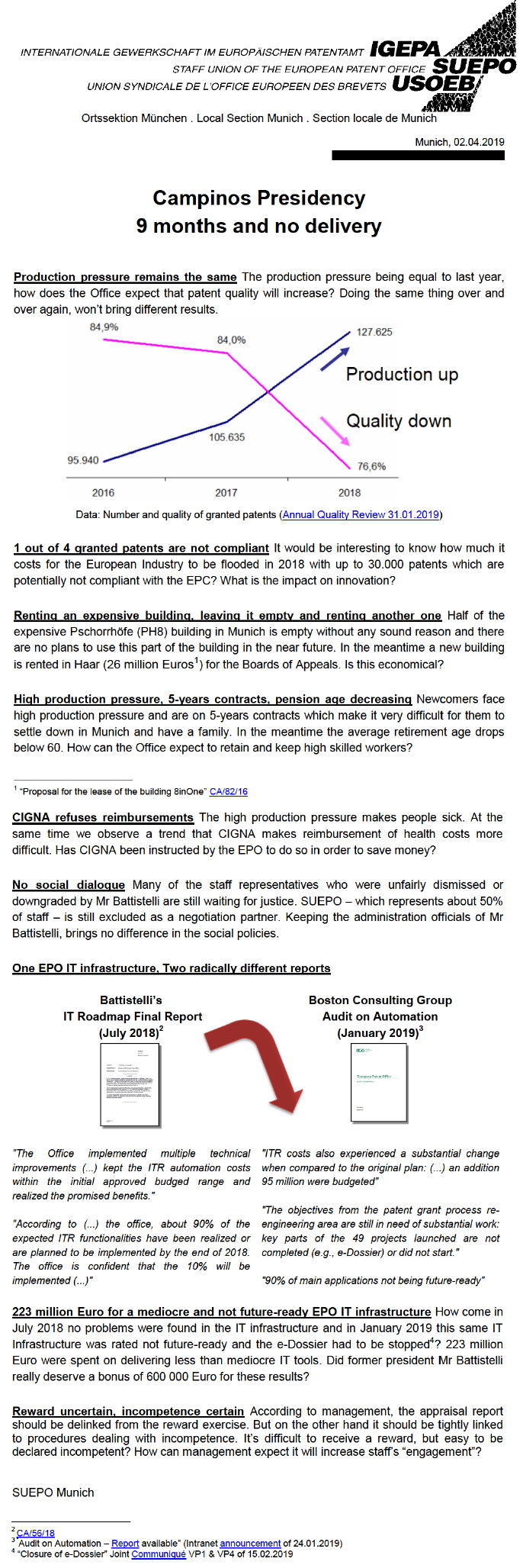

PRESIDENT António Campinos -- like Battistelli before him -- welcomes software patents into Europe in defiance of the law. Brimelow had welcomed them "as such", but that didn't go so far. Europe's Office -- like the American Office (USPTO) -- can grant all the patents it wants; but if courts say "no!" to granted patents, what will these patents be worth? Legal certainty suffers profoundly. We can't say that often enough. They're digging their own graves. They must choose between quality and quantity.
Three patent offices face questions stemming from the growing implications of artificial intelligence (AI) disrupting the intellectual property legal framework. The United States Patent Office (USPTO), European Patent Office (EPO), and United Kingdom Intellectual Property Office (UKIPO) recently received two patent application filings directed to a beverage container and a flashing device used for attracting enhanced attention. While these patent applications may have initially gone unnoticed, the applications have attracted vast attention for primarily one reason—they name DABUS, an AI machine, as an inventor.
DABUS is a type of “Creativity Machine” which can generate ideas without human intervention and was developed by Stephen Thaler. While DABUS may have been “trained” to develop new ideas by a human, the two pending patent inventions were created autonomously by DABUS, resulting in DABUS named as an inventor.
Aseptika and Renfrew Group International (RGi) worked together on the design and prototyping of the Activ8rlives BuddyWotch. This solution will provide "expert" pathways for use by patient, carers and the healthcare team to inform, manage and report the success of self-care plans. It aims to help patients remain independent at home, with a better quality and more sustainable model of care.
BuddyWotch will continuously monitor, record and transmit the patient's physiological signs of blood oxygen, heart rate, breathing rate and temperature for 24-hours-a-day, seven-days-a-week. With its integrated nine-axis accelerometer, BuddyWotch tracks the patient's physiological signs and how these change over time as the patient goes about daily life.
As well as acting as an alert in case of medical emergencies, this information is used to continuously calculate the patient's overall health and to detect whether the wearer's health is getting better or is declining rapidly. It can be used to test the patient in a GP clinic using the six-minute walk test.
The BuddyWotch platform connects directly to the Company's Activ8rlives Cloud (or can be pointed to a partner's cloud system). Activ8rlives has portals for the patient, for family members caring for them and for clinicians, providing continuous monitoring and alerts as well as the index of tolerance to exercise, itself perhaps a better indication of overall health than simple alerts usually associated with remote monitoring systems.
The BuddyWotch transmits information to-and-from the wearer using an integrated 4G modem and WiFi, so that no separate home hub or smartphone is required by the user.
The general counsel at a financial services company in New York adds that his business thinks about patent monetisation a great deal. As one of the largest patent filers for blockchain technologies, his firm is considering how it can generate returns by using decentralised-ledger solutions in new and interesting ways.
Austria is ready for the Unified Patent Court and business at Vienna's patent firms is stable. However, the JUVE Patent ranking analysis 2019 shows the country’s leading patent litigation firms are on the cusp of a generational change. Whether today’s young litigators have what it takes to follow in the footsteps of veterans such as Lothar Wiltschek and Christian Gassauer-Fleissner remains to be seen.
[...]
Most Austrian patent attorneys continue to work among themselves. Most are organised in very small outfits with one to three fee earners. For the first time this year, JUVE Patent has compiled a list of the best-known Austrian patent attorneys. In this list, our readers will also find information on the practices’ most frequently-recommended technical areas, as well as their locations and size.
The amendment was part of a legislative pact. The aim of the amendment to the professional law for patent attorneys is to prepare them for the requirements of the Unified Patent Court.
[...]
According to the bill, this would enable Austrian patent attorneys to obtain the European Patent Litigation Certificate. It is the prerequisite for patent attorneys to be able to conduct proceedings before the UPC.
[...]
There are still some question marks surrounding the launch of the UPC and the planned local chamber in Vienna. A complaint to the German Federal Constitutional Court is still blocking ratification in Germany. Since 2017, the European patent community has been eagerly awaiting the court’s decision.
The Austrian patent community is relatively relaxed about the delay [sic]. Experts are in favour of the court, but do not expect the UPC to boost their own business. The current situation is satisfactory to most Austrian patent firms.